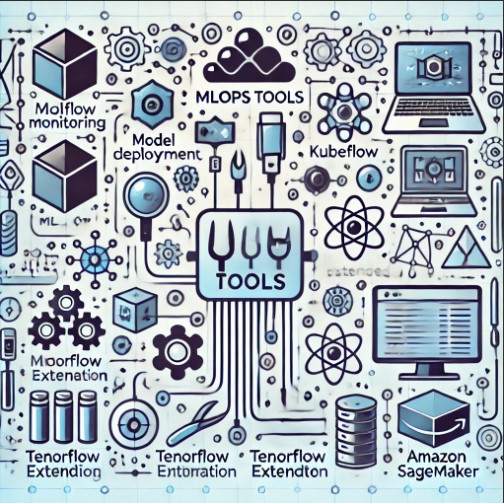Table of Contents
Introduction
Machine learning operations (MLOps) have revolutionized the way data scientists, machine learning engineers, and DevOps teams collaborate to deploy, monitor, and manage machine learning (ML) models in production. With AI workflows becoming more intricate and demanding, MLOps tools have evolved to ensure seamless integration, robust automation, and enhanced collaboration across all stages of the ML lifecycle. In this guide, we’ll explore the top 10 MLOps tools to streamline your AI workflow, providing a comprehensive comparison of each to help you select the best tools for your needs.
Top 10 MLOps Tools to Streamline Your AI Workflow
Each of the tools below offers unique features that cater to different aspects of MLOps, from model training and versioning to deployment and monitoring.
1. Kubeflow
- Overview: Kubeflow is an open-source MLOps platform that simplifies machine learning on Kubernetes. Designed to make scaling ML models easier, Kubeflow is favored by enterprises aiming for robust cloud-native workflows.
- Key Features:
- Model training and deployment with Kubernetes integration.
- Native support for popular ML frameworks (e.g., TensorFlow, PyTorch).
- Offers Kubeflow Pipelines for building and managing end-to-end ML workflows.
- Use Case: Ideal for teams already familiar with Kubernetes looking to scale ML operations.
2. MLflow
- Overview: MLflow is an open-source platform for managing the ML lifecycle. Its modular design allows teams to track experiments, package ML code into reproducible runs, and deploy models.
- Key Features:
- Supports tracking of experiments and logging of parameters, metrics, and artifacts.
- Model versioning, packaging, and sharing capabilities.
- Integrates with popular ML libraries, including Scikit-Learn and Spark MLlib.
- Use Case: Great for teams focused on experiment tracking and reproducibility.
3. DVC (Data Version Control)
- Overview: DVC is an open-source version control system for ML projects, facilitating data versioning, model storage, and reproducibility.
- Key Features:
- Version control for datasets and models.
- Simple Git-like commands for managing data.
- Integrates with CI/CD systems for ML pipelines.
- Use Case: Suitable for projects with complex data dependencies and versioning needs.
4. TensorFlow Extended (TFX)
- Overview: TFX is a production-ready, end-to-end ML platform for deploying and managing models using TensorFlow.
- Key Features:
- Seamless integration with TensorFlow, making it ideal for TensorFlow-based workflows.
- Includes modules like TensorFlow Data Validation, Model Analysis, and Transform.
- Supports Google Cloud’s AI Platform for scalability.
- Use Case: Best for teams that already use TensorFlow and require an end-to-end ML platform.
5. Apache Airflow
- Overview: Apache Airflow is a popular open-source tool for orchestrating complex workflows, including ML pipelines.
- Key Features:
- Schedule and manage ML workflows.
- Integrate with cloud providers and on-premise systems.
- Extensible with custom operators and plugins.
- Use Case: Suitable for teams looking to automate and monitor workflows beyond ML tasks.
6. Weights & Biases (WandB)
- Overview: Weights & Biases (WandB) is a platform that offers experiment tracking, model versioning, and hyperparameter optimization.
- Key Features:
- Track, visualize, and compare experiments in real-time.
- Collaborative features for sharing insights.
- API integrations with popular ML frameworks.
- Use Case: Useful for research-oriented teams focused on extensive experimentation.
7. Pachyderm
- Overview: Pachyderm is an open-source data engineering platform that combines version control with robust data pipeline capabilities.
- Key Features:
- Data versioning and lineage tracking.
- Scalable pipeline execution on Kubernetes.
- Integrates with major ML frameworks and tools.
- Use Case: Ideal for projects with complex data workflows and version control requirements.
8. Azure Machine Learning
- Overview: Azure ML is a cloud-based MLOps platform that provides an end-to-end suite for model development, training, deployment, and monitoring.
- Key Features:
- Integrates with Azure DevOps for CI/CD pipelines.
- AutoML capabilities for accelerated model training.
- In-built tools for monitoring and model explainability.
- Use Case: Ideal for teams already invested in the Azure ecosystem.
9. Amazon SageMaker
- Overview: Amazon SageMaker provides a complete set of MLOps tools within the AWS ecosystem, from model training to deployment and monitoring.
- Key Features:
- Automated data labeling, model training, and hyperparameter tuning.
- Model deployment and management on AWS infrastructure.
- Built-in monitoring for model drift and data quality.
- Use Case: Suitable for businesses using AWS for their ML and AI workloads.
10. Neptune.ai
- Overview: Neptune.ai is a lightweight experiment tracking tool for managing ML model experiments and hyperparameters.
- Key Features:
- Tracks experiments and stores metadata.
- Collaborative and cloud-based for distributed teams.
- Integrates with popular ML frameworks like Keras, TensorFlow, and PyTorch.
- Use Case: Best for teams needing a dedicated tool for experiment tracking.
FAQ Section
What is MLOps?
MLOps, or Machine Learning Operations, is the practice of streamlining the development, deployment, and maintenance of machine learning models in production.
How do MLOps tools help in AI workflows?
MLOps tools offer functionalities like model training, experiment tracking, version control, and automated deployment, enabling efficient and scalable AI workflows.
Which MLOps tool is best for large-scale production?
Tools like Kubeflow, Amazon SageMaker, and Azure Machine Learning are preferred for large-scale, production-grade environments due to their cloud integration and scalability features.

Conclusion
The adoption of MLOps tools is essential for efficiently managing and scaling machine learning models in production. From open-source platforms like Kubeflow and MLflow to enterprise-grade solutions like Amazon SageMaker and Azure ML, the landscape of MLOps offers a wide range of tools tailored to different needs. When choosing the best MLOps tool for your team, consider your specific requirements-such as cloud integration, experiment tracking, model deployment, and scalability. With the right combination of tools, you can streamline your AI workflows and bring robust, scalable ML models into production seamlessly.
For more resources and insights on MLOps tools and AI workflows, check out additional guides from Analytics Vidhya and Machine Learning Mastery. Thank you for reading the DevopsRoles page!
